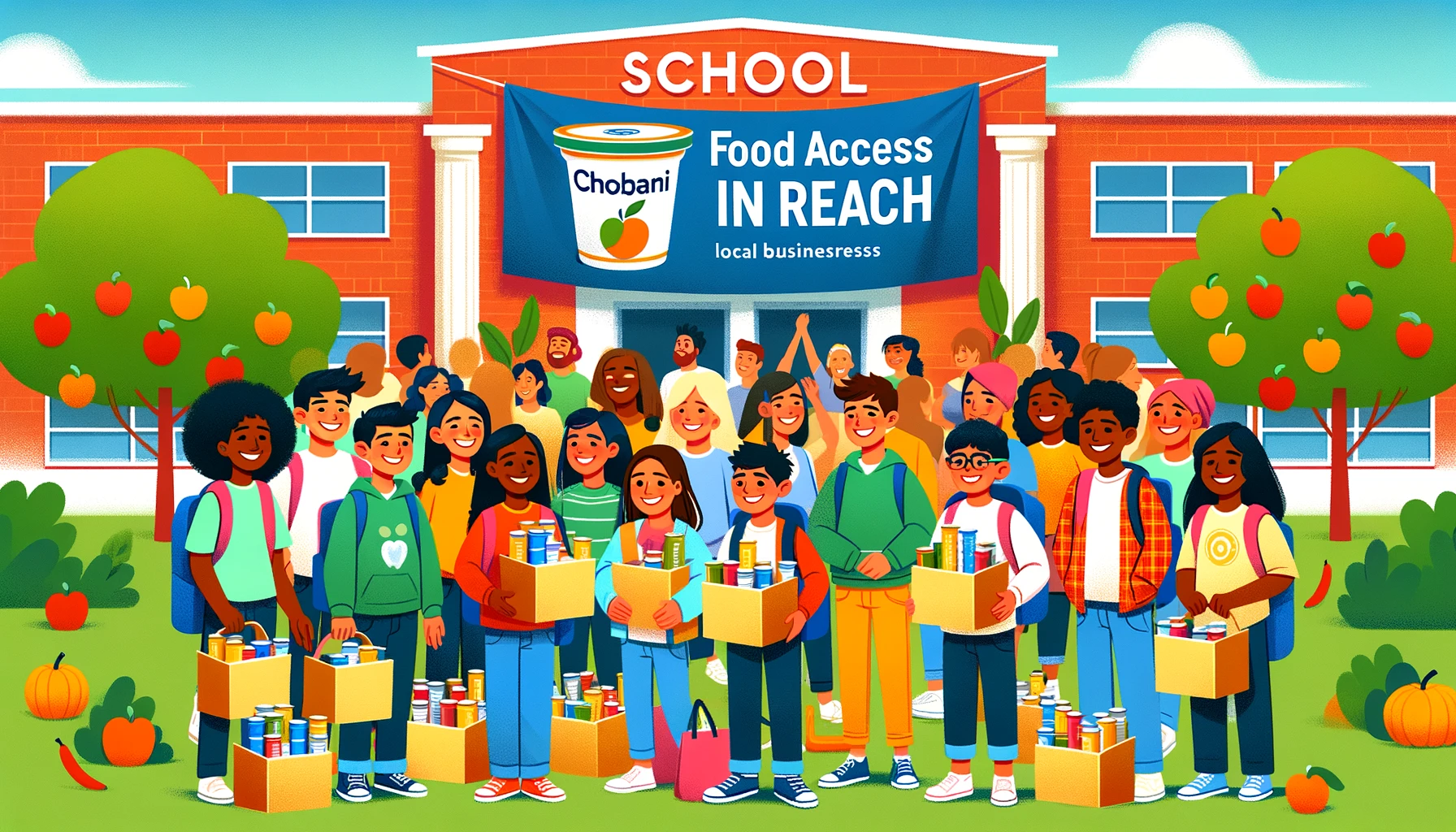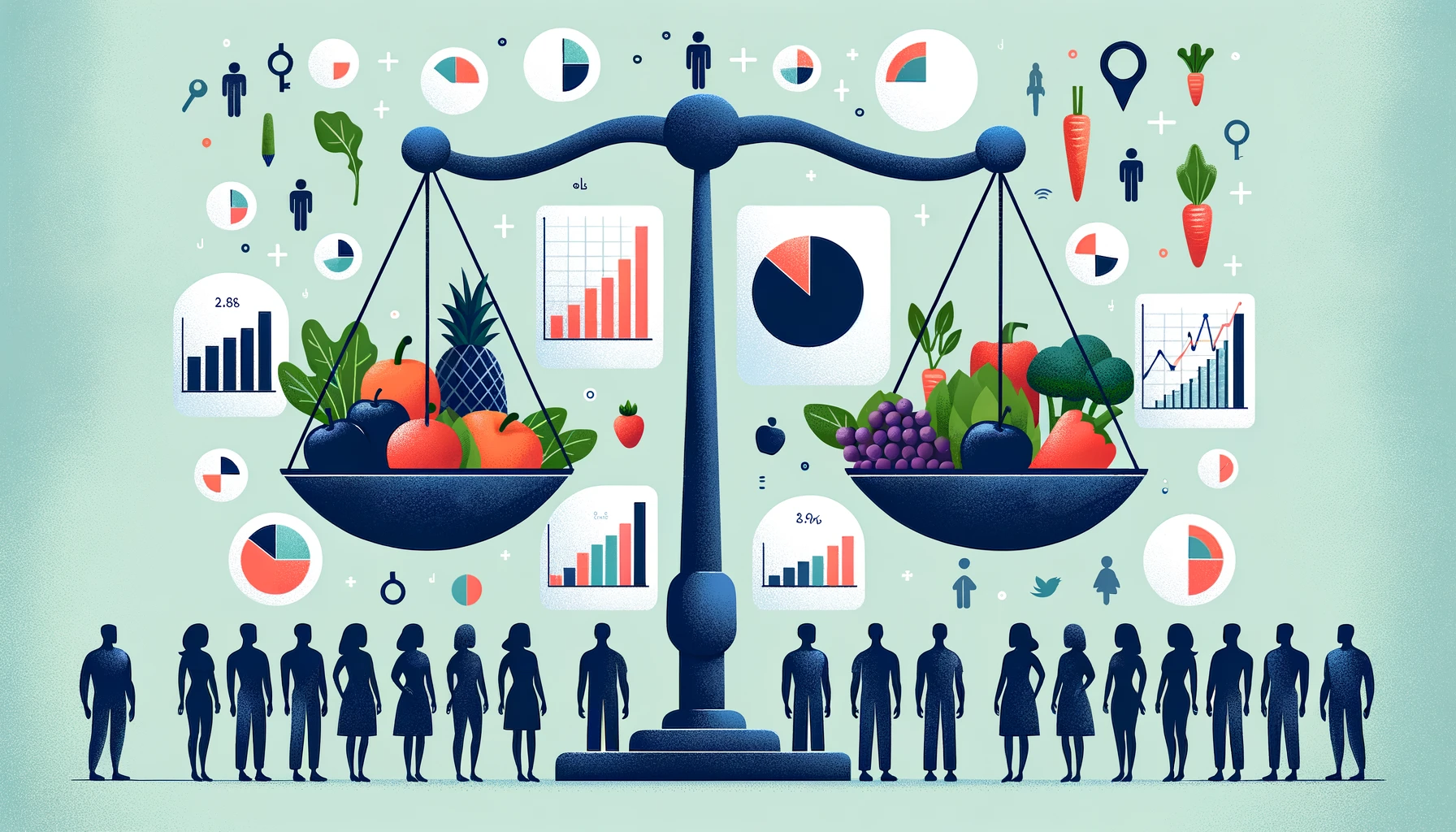I envision a future where hunger is eradicated, and diet-related diseases no longer haunt our society. This is not merely a dream; it is a bold vision that we can turn into reality by the year 2030. Together, we can create a world where every individual has access to nourishing food and lives a healthy, vibrant life.
The prevalence of food insecurity and diet-related diseases in the United States is staggering. Millions of Americans, particularly those from underserved communities, suffer from the devastating effects of hunger and poor nutrition. The pandemic has further exacerbated this crisis, highlighting the urgent need for action.
That’s why I am thrilled to announce that the Biden-Harris Administration is leading the charge in ending hunger and combating diet-related diseases. By collaborating with partners from various sectors, we are determined to address disparities and ensure that no one is left behind.
Through a comprehensive national strategy, we will tackle the root causes of these issues. By improving food access and affordability, integrating nutrition and health, empowering consumers to make healthy choices, promoting physical activity, and enhancing nutrition and food security research, we will bring about lasting change.
This vision is not just a lofty aspiration; it is a call to action. We invite advocacy groups, community organizations, food companies, healthcare providers, and government entities to join us in this noble endeavor. Together, we can create a healthier, more equitable future for all Americans.
Let us embark on this journey with unwavering determination and unwavering resolve. Our collective efforts can pave the way for a brighter, healthier future. The year 2030 may seem distant, but with our united efforts, it will be the year we celebrate the triumph over hunger and diet-related diseases.
Join me in embracing this bold vision for our nation. Together, we can make it a reality.

The White House Conference: Catalyzing Action
I am excited to share with you the upcoming White House Conference on Hunger, Nutrition, and Health, hosted by President Biden. This conference is a crucial step towards addressing the pressing issues of hunger, nutrition, and health in our nation. It aims to bring together leaders from various sectors to catalyze action and develop a transformative vision for a healthier America by 2030.
The White House Conference serves as a platform for collaboration and commitment to ending hunger and reducing diet-related diseases. The Biden-Harris Administration has already launched a nationwide call to action, resulting in over $8 billion in commitments from diverse partners. These commitments span philanthropic contributions, community-based organizations, investments in businesses, and nutrition programs, showcasing an all-encompassing approach to create meaningful change.
“The conference aims to lay out a transformative vision for ending hunger and reducing diet-related diseases by 2030.”
Pillar 1: Improve Food Access and Affordability
One of the key pillars of the conference is to improve food access and affordability for all Americans. Partners such as AARP, Benefits Data Trust, Bowery, Chobani, DoorDash, FoodCorps, the Food Industry Association, Google, and many others have made commitments to tackle this issue head-on. Their efforts range from expanding research on access to public benefits, donating fresh produce to food banks, addressing transportation barriers, increasing access to school meals, and improving SNAP and WIC access.
This collaborative and multi-faceted approach ensures that individuals, regardless of their background or circumstances, have access to healthy and affordable food options that promote overall well-being and prevent diet-related diseases.
Pillar 2: Integrate Nutrition and Health
Another crucial pillar of the conference is to integrate nutrition and health. The Biden-Harris Administration has laid out plans to pilot coverage of medically tailored meals in Medicare, test Medicaid coverage of nutrition education and supports, and expand access to nutrition and obesity counseling. Additionally, proposals include developing front-of-package labeling for food packages, updating nutrition criteria for the “healthy” claim, and incentivizing fruits and vegetables in SNAP. By prioritizing nutrition and health, we can make significant strides in disease prevention and overall wellness.
Pillar 3: Empower All Consumers to Make Healthy Choices
Empowering consumers to make healthy choices is fundamental to the conference’s vision. Proposals to develop front-of-package labeling, update nutrition criteria, and incentivize fruits and vegetables in SNAP reinforce the importance of informed decision-making. By reducing sodium and sugar consumption, improving health care delivery, and supporting research on nutrition and food security, the administration aims to support individuals in making choices that promote their well-being.
Pillar 4: Support Physical Activity for All
The Biden-Harris Administration recognizes the significance of physical activity in maintaining good health. By expanding the CDC’s State Physical Activity and Nutrition Program to all states and territories, investing in connecting people to parks and outdoor spaces, and promoting the Physical Activity Guidelines for Americans, individuals will have more opportunities to engage in physical activity. Creating safe spaces and increasing awareness about the benefits of physical activity will contribute to a healthier and more active population.
Pillar 5: Enhance Nutrition and Food Security Research
Enhancing nutrition and food security research is essential in developing evidence-based policies and programs. By improving nutrition metrics, data collection, and focusing on equity and access, we can address the underlying issues that lead to hunger and diet-related diseases. The Biden-Harris Administration is committed to investing in nutrition science, supporting research on equity, and advancing our understanding of nutrition and food security.
The White House Conference on Hunger, Nutrition, and Health represents a landmark event that brings together stakeholders from across the nation to commit to a bold vision for a healthier America. By catalyzing action through the pillars of improving food access, integrating nutrition and health, empowering consumers, supporting physical activity, and enhancing research, we can make tangible progress towards ending hunger and tackling diet-related diseases. Together, we can create a future where every American has access to nutritious food and enjoys optimal health.
Pillar 1 – Improve Food Access and Affordability
Ensuring access to healthy and affordable food is a crucial step in ending hunger and reducing diet-related diseases. Several organizations have made commitments to improve food access and affordability, working towards a more equitable and nourished future for all.
Commitments by AARP and Benefits Data Trust
AARP, a nonprofit organization that advocates for older adults, is committing to expanding research on older adults’ access to the Supplemental Nutrition Assistance Program (SNAP). By understanding the barriers faced by this population, AARP aims to improve enrollment rates and ensure that older adults have access to the nutritious food they need.
Benefits Data Trust, another organization focused on improving access to public benefits, including SNAP and Medicaid, plans to utilize technology to enhance access to these programs. By streamlining the application process and reducing bureaucratic hurdles, Benefits Data Trust aims to make it easier for individuals to access the support they need to afford nutritious food.
Partnerships and Initiatives for Fresh Produce and Food Security
Bowery, an indoor farming company, is forging new partnerships to donate fresh produce to food banks. By leveraging innovative farming techniques, Bowery aims to increase the availability of nutritious fruits and vegetables for individuals facing food insecurity.
Chobani, a leading yogurt brand, is launching the “Food Access in Reach” initiative to encourage businesses to adopt schools and ensure food and nutrition security. By forming partnerships between local businesses and schools, Chobani aims to create a supportive ecosystem that promotes access to healthy food options for students and their families.
In addition to these commitments, DoorDash, a food delivery platform, will be partnering with cities to combat hunger by addressing transportation barriers and providing free food delivery. This collaboration will ensure that individuals in underserved areas have access to the food they need, irrespective of their physical limitations or location.

Investing in School Meals and Nutrition Education
FoodCorps, a nonprofit organization dedicated to connecting kids to healthy food in schools, will be investing in increasing access to school meals and nutrition education. By teaching children about the importance of healthy eating and providing nutritious meals at school, FoodCorps aims to lay the foundation for a lifetime of positive health choices.
The Food Industry Association, a leading trade association for the food industry, will mobilize its membership to donate meals, improve SNAP and WIC access, and promote consumer education. By leveraging the reach and influence of the food industry, this commitment aims to address the root causes of food insecurity and improve access to nutritious food for all individuals.
These commitments and initiatives, along with those from other organizations such as Hunger Free Oklahoma, Hy-Vee, Inc., National Grocers Association, National Head Start Association, Nayak Farms, and Novo Nordisk, demonstrate a collective effort to address food access and affordability. By working together and taking decisive action, we can create a future where no one goes hungry and everyone has access to the nourishment they need to thrive.
| Organization | Commitment |
|---|---|
| AARP | Expand research on older adults’ access to SNAP and improve enrollment rates |
| Benefits Data Trust | Use technology to improve access to public benefits, including SNAP and Medicaid |
| Bowery | Forge partnerships and donate fresh produce to food banks |
| Chobani | Launch the “Food Access in Reach” initiative to encourage businesses to adopt schools and ensure food and nutrition security |
| DoorDash | Partner with cities to combat hunger by addressing transportation barriers and providing free food delivery |
| FoodCorps | Invest in increasing access to school meals and nutrition education |
| Food Industry Association | Mobilize membership to donate meals, improve SNAP and WIC access, and promote consumer education |
| Other organizations | Making commitments to address food insecurity and improve access to nutritious food |
Pillar 2 – Integrate Nutrition and Health
Nutrition and health are closely intertwined, and the Biden-Harris Administration recognizes the importance of integrating these two aspects to promote well-being. As part of their strategy, they plan to pilot coverage of medically tailored meals in Medicare, acknowledging the impact of nutrition on overall health outcomes. By testing Medicaid coverage of nutrition education and supports, they aim to provide individuals with the tools they need to make informed choices about their diet.
To further support nutrition and health, the administration is working on developing front-of-package labeling for food packages. This initiative will make it easier for consumers to identify healthy options and make informed decisions. Additionally, they plan to update the nutrition criteria for the “healthy” claim, ensuring that it accurately reflects the nutritional value of the food product.
The strategy also includes incentivizing fruits and vegetables in the Supplemental Nutrition Assistance Program (SNAP). By making these nutritious options more affordable and accessible, the administration aims to empower individuals to make healthier choices. Furthermore, they are committed to reducing sodium and sugar consumption, as these are key contributors to diet-related diseases.
Testing innovative ideas and supporting disease prevention
To drive innovation and support disease prevention, the Biden-Harris Administration is investing in research and initiatives focused on nutrition and food security. By supporting the testing of new approaches, such as medically tailored meals and nutrition education in Medicaid and Medicare, they aim to gather valuable data and insights that can inform future policies and programs.
“Integrating nutrition and health is crucial for addressing diet-related diseases and promoting overall well-being. By providing coverage for medically tailored meals and nutrition education, we can empower individuals to take control of their health and make informed choices about their diet.” – President Biden
The administration also recognizes the importance of data collection and research on equity and access to address disparities in nutrition and food security. By bolstering funding for nutrition science and research, they aim to develop a deeper understanding of the challenges faced by underserved communities and work towards equitable solutions.
| Medicare | Medicaid | SNAP | Disease Prevention |
|---|---|---|---|
| Pilot coverage of medically tailored meals | Test coverage of nutrition education and supports | Incentivize fruits and vegetables | Reduce sodium and sugar consumption |
| Update nutrition criteria for the “healthy” claim | |||
| Support research on nutrition and food security |

Pillar 3 – Empower All Consumers to Make Healthy Choices
As we strive to tackle the challenges of food insecurity and diet-related diseases, it is essential that we empower all consumers to make healthy choices. Through targeted initiatives and education, we can provide individuals with the knowledge and tools they need to prioritize their health and well-being.
Front-of-Package Labeling
A key proposal within the strategy is the development of front-of-package labeling for food packages. This labeling system will provide clear and easily understandable information about the nutritional content of products, allowing consumers to make informed decisions about their food choices. By highlighting key nutritional facts and ingredients, individuals can quickly assess whether a product aligns with their health goals.
Updated Nutrition Criteria
Another important aspect of empowering consumers is updating the nutrition criteria for the “healthy” claim. By setting higher standards for what qualifies as a healthy food, we can guide individuals towards making choices that support their overall well-being. This includes incentivizing the consumption of fruits and vegetables through programs such as the Supplemental Nutrition Assistance Program (SNAP), which provides access to nutritious food for low-income individuals and families.
Consumer Education and Physical Activity
Equipping consumers with the knowledge and skills to make healthy choices extends beyond labels and criteria. It also involves comprehensive consumer education programs that promote nutrition literacy and provide guidance on meal planning, cooking, and portion control. Additionally, promoting physical activity and creating safe and accessible spaces for exercise are vital components of empowering individuals to lead healthy lifestyles.
By focusing on these initiatives and prioritizing consumer empowerment, we can cultivate a culture of health and well-being. Through education, accessible information, and support, we can ensure that all individuals have the ability to make choices that promote their overall health and contribute to the reduction of diet-related diseases.
Pillar 4 – Support Physical Activity for All
The Biden-Harris Administration recognizes the importance of physical activity in promoting overall health and well-being. To support physical activity for all Americans, the administration has outlined several key initiatives and strategies.
Investing in Safe Spaces
Creating safe and accessible spaces for physical activity is essential to encourage individuals of all ages and abilities to engage in regular exercise. The administration plans to invest in connecting people to parks and outdoor spaces, ensuring that everyone has the opportunity to enjoy the benefits of being active in a secure environment.
Promoting Awareness
Increasing awareness about the importance of physical activity is crucial to inspire individuals to adopt an active lifestyle. The administration aims to raise awareness through public campaigns, educational initiatives, and community outreach programs. By highlighting the numerous benefits of physical activity, such as improved physical and mental health, the administration hopes to motivate more people to incorporate exercise into their daily routines.
Guidelines for Active Living
Guidelines play a vital role in providing individuals with evidence-based recommendations for physical activity. The administration is committed to promoting and disseminating the Physical Activity Guidelines for Americans, which provide clear and actionable recommendations for different age groups and populations. These guidelines serve as a valuable resource for healthcare professionals, educators, and individuals seeking guidance on maintaining an active and healthy lifestyle.
| Initiative | Description |
|---|---|
| Investing in Safe Spaces | The administration plans to invest in connecting people to parks and outdoor spaces, ensuring that everyone has access to safe environments for physical activity. |
| Promoting Awareness | The administration aims to raise awareness about the benefits of physical activity through public campaigns, educational initiatives, and community outreach programs. |
| Guidelines for Active Living | The administration is committed to promoting and disseminating the Physical Activity Guidelines for Americans, providing evidence-based recommendations for different age groups and populations. |
Pillar 5 – Enhance Nutrition and Food Security Research
The Biden-Harris Administration’s comprehensive strategy to end hunger and tackle diet-related diseases also emphasizes the need to enhance nutrition and food security research. This pillar recognizes the importance of robust data collection, equity, and addressing disparities in order to inform effective policies and interventions.
In order to advance nutrition science and understanding, the administration plans to bolster funding for research initiatives. This investment will support studies aimed at improving nutrition metrics, collecting accurate and comprehensive data, and identifying equity gaps in nutrition and food security. By prioritizing research, the administration aims to gain valuable insights that will guide evidence-based decision-making and ensure that no one is left behind in efforts to improve access to nutritious food.
Effective Data Collection for Informed Policies
Data collection is a vital component of tackling nutrition and food security challenges. The administration recognizes the need for accurate, up-to-date data in order to identify disparities and develop targeted interventions. By investing in research that focuses on data collection methodologies, the administration aims to ensure that policies are based on a thorough understanding of the challenges faced by different communities.
This pillar also underscores the importance of addressing equity in nutrition research. By examining disparities in access to healthy food and identifying barriers to food security, researchers and policymakers can work together to develop interventions that promote equity and improve outcomes for marginalized populations.

Research as a Driver of Progress
Through enhanced nutrition and food security research, the Biden-Harris Administration aims to drive progress towards ending hunger and reducing diet-related diseases. By investing in research initiatives, collecting robust data, and addressing equity and disparities, the administration is taking a proactive approach to inform policies that will have a lasting impact on the health and well-being of all Americans.
Only through a comprehensive understanding of the challenges and disparities can effective solutions be developed. By prioritizing nutrition research, the administration is paving the way for evidence-based interventions that will empower individuals and communities to make healthier choices and ensure equitable access to nutritious food for all.
| Key Focus Areas | Actions |
|---|---|
| Enhancing data collection | Funding research to improve data collection methodologies and ensure accurate and comprehensive information |
| Promoting equity | Addressing disparities in access to healthy food through research and developing interventions that promote equity |
| Driving progress | Investing in research initiatives to inform evidence-based policies and interventions that target nutrition and food security challenges |
Conclusion
Ending hunger and tackling diet-related diseases is a bold vision for 2030. As we strive for a healthier nation, collaboration and action are key. The Biden-Harris Administration is committed to addressing these pressing issues through a comprehensive national strategy.
By working together with partners from various sectors, including advocacy groups, community organizations, food companies, healthcare providers, and government entities, we can create lasting change. This strategy emphasizes the power of collaboration in bringing about positive transformations.
Through the implementation of the strategy’s pillars, we can take concrete actions to ensure healthy living for all Americans. By improving food access and affordability, integrating nutrition and health, empowering consumers to make healthy choices, supporting physical activity, and enhancing nutrition and food security research, we are laying the foundation for a healthier future.
Let us join forces, unite our resources, and turn this bold vision into reality. Together, we can end hunger, reduce diet-related diseases, and create a nation where every individual can thrive. Through collaboration and action, we will make a positive impact on the lives of millions. Join me in this transformative journey towards a healthier and more equitable America.
FAQ
What is the goal of the White House Conference on Hunger, Nutrition, and Health?
The goal of the conference is to catalyze action to end hunger and reduce diet-related diseases, while addressing disparities in impacted communities.
How much money has been committed to addressing food insecurity and diet-related diseases?
Over $8 billion in commitments have been made from various sectors, including philanthropic contributions, investments, and nutrition programs.
What commitments have been made by AARP?
AARP has committed to expanding research on older adults’ access to SNAP and improving enrollment rates.
How does DoorDash plan to combat hunger?
DoorDash will partner with cities to address transportation barriers and provide free food delivery.
What is the Biden-Harris Administration’s plan for Medicare and Medicaid?
The administration plans to pilot coverage of medically tailored meals in Medicare and test Medicaid coverage of nutrition education and supports.
What proposals does the strategy include to improve nutrition?
The strategy includes proposals to develop front-of-package labeling for food packages, update the nutrition criteria for the “healthy” claim, and incentivize fruits and vegetables in SNAP.
How does the Biden-Harris Administration plan to support physical activity?
The administration plans to expand the CDC’s State Physical Activity and Nutrition Program, invest in connecting people to parks and outdoor spaces, and promote the Physical Activity Guidelines for Americans.
How will the administration enhance nutrition and food security research?
The administration plans to bolster funding to advance nutrition science and address disparities in nutrition and food security.
Source Links
- https://health.gov/our-work/nutrition-physical-activity/white-house-conference-hunger-nutrition-and-health
- https://www.whitehouse.gov/briefing-room/statements-releases/2022/09/28/fact-sheet-the-biden-harris-administration-announces-more-than-8-billion-in-new-commitments-as-part-of-call-to-action-for-white-house-conference-on-hunger-nutrition-and-health/
- https://www.whitehouse.gov/wp-content/uploads/2022/09/White-House-National-Strategy-on-Hunger-Nutrition-and-Health-FINAL.pdf

For the reason that the admin of this site is working, no uncertainty very quickly it will be renowned, due to its quality contents.